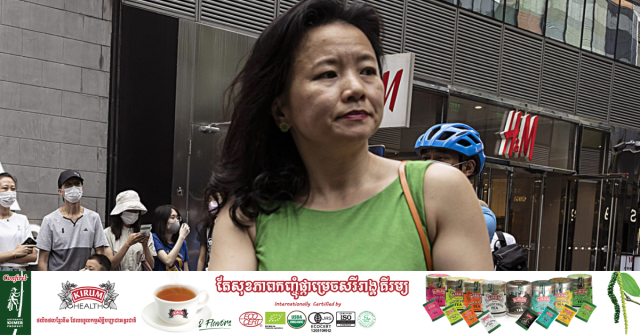Why Some Students Shunned the National Exam

- By Meng Seavmey
- December 31, 2022 2:12 PM
PHNOM PENH – Personal issues, parents’ lack of encouragement, and pressure from external factors such as school, society and family, as well as teachers’ qualifications affected students’ decision on taking the national exam, experts say.
No study on the reasons for students dropping out or failing to take the exam but teachers and education researchers have drawn conclusions based on their observations and experience.
Ros Soveacha, spokesperson for the Ministry of Education, Youth and Sports, said around 24,000 students did not show up on the national exam day. Of these, 90 percent had failed in the previous years.
For those with personal issues, Pin Bunthorng, a high school teacher in Takeo province, said students were demotivated due to the lack of confidence, which resulted from irregular attendance and negative thoughts about the exam result.
There would be two consequences if they took the exam: failing or passing. On the other hand, it would be 100 percent failing for those who had already given up on the exam. Even if they were not sure what the high school diploma could do for them right now, it would be useful in the future when needed, the teacher said.
“I always tell them that, even if they don’t care much about their diploma, but they should value the country more, as a citizen they should live an educated person after completing high school even though they don’t plan on going to college,” he said.
A higher education teacher also in Takeo province who asked not to be named said there were two main reasons for non-participation in the exam: weak foundation knowledge from the lower grades and lack of interest in studying — which led to less confidence for the exam.
Other reports suggest that in some schools, shortcomings in earlier years meant that students were not well enough prepared to sit the national exam.
They did not have interest nor confidence when it came to the national exam, he indirectly told Cambodianess via Telegram, adding that they became demotivated by their worries about the exam result.
Another reason is that the exam centers are in the main provincial town, far for some students who come from rural areas. This is also a factor demotivating their willingness to sit the exam, considering the expenses on transport and accommodation.
Meas Nee, a policy analyst, said the dropout cases did not only happen to high school students but to also the lower grades. Those students who did not have enough confidence were affected by the restriction on the exam.
“They might have thought that they could not catch up with the others,” the analyst said.
Of the 500 high school participants in the study, 93 percent said they took extra classes at school. However, it was not known if the students absent from the exam also took the extra classes, Meas Nee added, citing his study in 2021.
There were two questions for those who did not take the extra classes: were they already not confident for the exam? Or could they not afford the fee?
Regardless, there was an assumption that those who were absent or dropped out did so because they could not continue their study or afford the extra classes. These factors added up to their reasons to drop out.
Bunthorng had a similar thought on the financial issue. He had seen some of the students choosing to work, especially at a factory, because immediate income was their first priority due to their family’s finances.
Also, some parents demotivated students by pushing them to run a business instantly, on the basis that “sooner or later, they will run the business anyway, so it does not matter whether they finish high school or not.”
The teacher thinks this is one of the views that prevent Cambodia’s human resources from moving forward and should be changed because they did not give enough value for education or human resource which is one of the milestones of the country’s development.
Bunthorng said part-time classes on the major subjects also contributed to decisions to drop out or not taking the exam. The classes cost money and once students could not afford the fee, they were likely to stop too.
“If the teachers teach regularly and focus more during the full-time classes at public schools instead of giving their all for only part-time classes, it’ll make it easier for those who cannot afford it,” he said.
Social media, which could provide benefits or distraction, and their circle of friends was also an issue for their decision.
Absentee total falls but is still worrying
The good news was the number of absent students on the exam day decreased by half compared to last year. However, the number remains concerning, researchers said.
Meas Nee said it could affect the rate of the country’s higher education students. He said only 15 percent of the registrations in the beginning of the higher education academic year finished their major.
The fewer students get into college, the fewer graduates.
Heng Kimkong, a researcher and expert in education, said if the students did not have a high school diploma, they would not get to continue to a higher education. It could affect both the students’ future education and career as some jobs require the high school diploma.
“It’ll make it more difficult for the country to become a knowledge-based country,” the researcher explained, adding that it affects the whole education system as there will be a lack of students in higher education.
More work be done
Moves to reduce the number of dropouts should start from the students themselves to the family, teachers, schools and the ministry. Bunthorng said cultivating the idea of studying for the nation, not only for themselves, is what makes the human resources in the country reliable.
Teachers must improve their skills. Public institutes should prioritize strengthening teachers’ quality and monitoring their performance.
“I admit that there are more individual tasks, but they ought to know their role,” the teacher said, “Everyone, regardless of what their job is, is encouraged to learn more to improve themselves because there is no limitation to learning,” he said.
Parents should motivate their children instead of putting more pressure on them. They need more of encouragement and financial support from not only the parents but all stakeholders in the field of education and the public.
Kimkong said schools should further spread awareness of values of education among students. Students who passed can use the diploma to pursue a bachelor’s degree. Those who fail can still use it to study for an associate degree.
Kimkong said encouragement plays an important role in motivating students, especially those who got bad results after the mock test, carried out to measure students’ capability before the real exam.
The students must be told about study tips and exam strategy to build up their confidence for the national exam.
There should be divided exam centers in districts as well to make it more convenient for students who live far from the exam center.
Meas Nee said the ministry is encouraged to study on these two cases: one on why students did not take the national exam, and one on where the students failing the exam will go afterwards. The data is very important, as these groups are still within the education framework.
Ros Soveacha, the spokesperson of the ministry, said the students abandoned the exam due to personal reasons.
The ministry continued to implement the four polices: rules, justice, transparency, and outcome to reduce the number of absent students on the exam day to the minimum.















